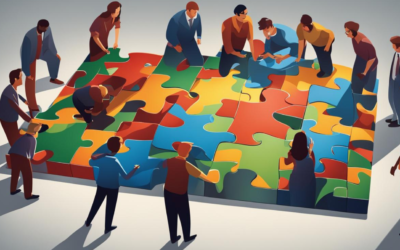Effective communication channels are the backbone of a successful team.
Developing communication channels is crucial for boosting collaboration and productivity within your organization.
This article we will provide you with proven tips and strategies to help you develop effective communication channels.
Effective Communication Channels Development Tips
Key Takeaways
- Effective communication channels are essential for team success.
- Developing communication channels can boost collaboration and productivity.
- It’s crucial to assess current communication methods to identify areas of improvement.
- Transparent communication processes promote open dialogue and collaboration.
- Active listening and feedback are crucial components of effective communication channels.
Understanding the Importance of Effective Communication Channels
Effective communication channels are an essential component of any successful team. Clear and efficient communication channels are responsible for fostering collaboration and driving productivity.
When team members are able to communicate effectively, they can share ideas, offer support, and solve problems efficiently.
Additionally, effective communication channels promote transparency and accountability, which can help prevent misunderstandings and conflicts.
By implementing effective communication channels, teams can build trust and strengthen relationships. Enhanced collaboration leads to better decision-making, faster results, and overall improved performance.
Therefore, it’s crucial to understand the importance of developing a communication strategy that works for your team’s needs.
By establishing clear and effective communication channels, your team will be able to work more efficiently, leverage individual strengths, and achieve shared goals.
In the following sections, we will explore strategies for developing effective communication channels that will help you unlock success and create a culture of effective communication within your organization.

Game shows for Team Building
Assessing Current Communication Methods
To develop effective communication channels, it’s crucial to assess your current communication methods objectively.
Evaluating your current communication channels will help you identify gaps in your team’s communication process, which can then be improved with the right strategies.
Start by analyzing your team’s typical communication patterns. Are most of your communications taking place through email, phone calls, or team messaging platforms?
Evaluate the effectiveness of these channels based on factors such as message delivery, response time, and overall clarity of communication.
Next, consider the perspective of your team members. Conduct surveys or focus groups to gather feedback directly from your team members about the current communication channels.
This will give you an insight into what channels are working well and which ones need improvement.
Finally, use the data gathered from the previous steps to chart out a plan for improving your communication channels.
Set specific goals for each communication channel, such as reducing response time or improving message clarity, and track progress over time.
This will allow you to continually refine your communication channels and ensure your team stays on track.
Got Games @ Work? PRESS PLAY!
![]()
Book a live game show experience today!
Contact us for further details. We come to you..
For Immediate assistance by text – 917-670-4689
No deposit required. 5-star rated on google.
We plan and facilitate all activities.
Defining Communication Goals and Objectives
Effective communication channels begin with clearly defined communication goals and objectives.
Defining these goals will provide a roadmap for developing strategies to establish successful channels.
When setting communication goals, using SMART (Specific, Measurable, Achievable, Relevant, and Time-bound) criteria will help you effectively measure progress and success.
Start by asking yourself what specific outcomes you want to achieve through communication.
This may include enhancing collaboration, increasing productivity, or improving team morale.
Once you have identified your goals, you can establish measurable objectives that will help you gauge progress toward success.
Be sure to set achievable objectives that align with your team’s resources and abilities.
Relevance is also essential when setting communication goals and objectives. Your objectives should tie in with your team’s overall mission and vision to ensure that they are aligned with your organization’s goals.
Lastly, establishing a time-bound framework that includes deadlines and checkpoints will help ensure that your team stays on track toward achieving its communication objectives.
Choosing the Right Communication Tools
When it comes to establishing effective communication channels, selecting the right communication tools is essential.
Choosing the best communication tools can increase productivity, streamline communication, and ensure that teams work together efficiently.
Here are some factors to consider when deciding which tools will best suit your team’s needs:
- Team size: Consider the size of your team when choosing communication tools. Smaller teams may be able to rely on simpler communication tools, while larger teams may require more advanced software.
- Communication needs: Think about the types of communication that are necessary for your team.
Are video conferencing, instant messaging, or project management tools necessary? Evaluate the features of various communication tools and whether they align with the specific needs of your team. - Accessibility: Ensure that the communication tools you choose are accessible to all team members. Consider factors such as compatibility with different devices and operating systems, internet connectivity requirements, and ease of use.
- Integration: Integration with other tools and software used by your team can improve workflow and streamline communication. Consider selecting tools that integrate with relevant software to prevent redundant tasks and improve productivity.
- Security: Ensure that the communication tools you choose provide sufficient security features to protect sensitive data. Evaluate encryption, authentication measures, and permissions to avoid data breaches and ensure the safety of your team’s information.
By keeping these factors in mind when choosing communication tools, you can establish effective communication channels that meet the unique needs of your team.
This will help to facilitate collaboration, boost productivity and create a culture of effective communication that drives success within your organization.
Establishing Transparent Communication Processes
To create a culture of effective communication within your team, it’s essential to establish transparent communication processes that promote clarity and understanding.
When communication is transparent, team members are more likely to feel comfortable sharing ideas and feedback, leading to increased collaboration and productivity.
One effective way of establishing transparent communication processes is to encourage open dialogue.
Create an environment where team members feel comfortable speaking up and expressing their thoughts and ideas. This can be achieved through regular team meetings or one-on-one sessions with team leaders.
Another important aspect of transparent communication is ensuring that everyone has access to the same information.
This can be achieved by using communication tools that allow for easy sharing of information, such as project management software or chat platforms.
Finally, it’s essential to establish clear guidelines on how communication should occur within the team. This includes defining expectations for communication frequency, response time, and acceptable modes of communication.
By setting clear expectations and guidelines, team members can more easily navigate communication processes.

Encouraging Active Listening and Feedback
Active listening and feedback play a vital role in effective communication channels. To foster a culture of active listening, it’s essential to encourage team members to be present and engaged in conversations.
This means refraining from distractions and actively listening to what the speaker is saying.
Encouraging team members to ask questions and seek clarification is also crucial for effective communication.
This not only helps to clear up any misunderstandings but also promotes deeper understanding and engagement.
Providing constructive feedback is equally important for fostering effective communication channels. When providing feedback, it’s essential to be specific, objective, and actionable.
This helps to ensure that the feedback is meaningful and can be acted upon to improve performance or communication.
To encourage feedback, it’s important to cultivate a safe and supportive environment where team members feel comfortable sharing their thoughts and opinions.
This means avoiding judgment and actively listening to feedback without becoming defensive or dismissive.

team-building-games
Promoting Cross-Team Collaboration
In today’s fast-paced business environment, collaboration across teams is essential for driving innovation and achieving the organization’s goals.
To promote effective collaboration, it’s important to identify and remove barriers that inhibit communication and collaboration between teams.
Here, we’ll discuss some strategies for fostering cross-team collaboration and breaking down silos within your organization.
- Encourage Open Dialogue – Create an environment that fosters open communication and encourages employees to share their ideas and perspectives. Hold regular cross-functional team meetings to facilitate better communication, exchange information, and develop shared goals.
- Establish Common Objectives – Work with other teams to establish common objectives and goals. By aligning strategies and objectives, cross-functional teams can build stronger relationships and achieve success by working collaboratively.
- Create a Collaborative Culture – Establish policies and processes that encourage collaboration and teamwork, foster a culture of mutual support, and reinforce the idea that we are all working towards the same goals.
- Use Technology to Facilitate Collaboration – Utilize advanced communication and project management tools to make collaboration and information sharing easier for cross-functional teams. By providing tools that facilitate collaboration, you can create an environment that encourages cross-functional team members to work together seamlessly.
By incorporating these strategies, you can promote cross-team collaboration, and create a more collaborative and productive organization.
The benefits of establishing stronger relationships between teams extend beyond the collaboration itself to embrace shared success and support.
Continuously Evaluating and Improving Communication Channels
The development of effective communication channels is an ongoing process. It’s crucial to evaluate your communication channels periodically to determine their effectiveness.
Evaluating your channels allows your team to identify areas that need improvement and make necessary changes that will enhance overall collaboration and productivity.
Continuous evaluation enables you to understand the changing needs of your team and adjust your communication channels to meet those needs.
Once you have conducted evaluations, it’s essential to use the findings to make targeted improvements. Implementing these changes will ensure that your communication channels remain efficient and relevant.
Some of the ways to improve your communication channels include incorporating new tools that better meet your team’s needs and establishing clearer communication processes.
The goal is to create a culture of effective communication that continually evolves to support your team’s success.
Training and Development for Effective Communication
Effective communication is a crucial cornerstone for any successful team.
But developing communication skills takes effort and commitment. Investing in the right training and development programs is vital to equipping your team with the necessary skills to establish effective communication channels.
One option is to bring in an external training provider to conduct training sessions specifically tailored to your team’s needs.
Online courses and webinars are also an excellent option, providing flexibility and convenience. Regular check-ins and follow-up sessions can help reinforce and build upon the skills learned.
Remember, communication skills take time and practice to develop. Encourage your team to continue to use these skills in their day-to-day work and provide ongoing opportunities to reinforce their learning.
With the right training and development, your team can become effective communicators, leading to better collaboration and increased productivity.
FAQ – Effective Communication Channels

frequently asked questions
How can I develop effective communication channels within my team?
To develop effective communication channels, you can start by assessing your current communication methods, defining clear communication goals and objectives,
Choosing the right communication tools, establishing transparent communication processes, encouraging active listening and feedback.
Last, promote cross-team collaboration, continuously evaluating and improving communication channels, and investing in training and development for effective communication.
Why are effective communication channels important?
Effective communication channels are essential for boosting collaboration and productivity within a team.
They promote clarity, understanding, and open dialogue, leading to better decision-making, stronger relationships, and improved problem-solving capabilities.
How can I assess my current communication methods?
To assess your current communication methods, you can evaluate the effectiveness of your existing communication channels, identify any areas that need improvement or refinement.
Gather feedback from team members, and consider the specific needs and preferences of your team.
What are SMART goals and why are they important in communication?
SMART goals are Specific, Measurable, Achievable, Relevant, and Time-bound goals.
They are important in communication because they provide clarity, focus, and a roadmap for your communication efforts.
SMART goals help you align your communication strategies with your overall objectives and ensure that you can measure the success of your communication channels.
How do I choose the right communication tools?
When choosing communication tools, consider factors such as your team’s communication needs and preferences, the nature of your work, the level of security required, ease of use, integrations with other tools, and the scalability of the tools.
It’s important to select tools that effectively facilitate communication and collaboration within your team.
What are transparent communication processes and how can I establish them?
Transparent communication processes are those that promote clarity, openness, and trust within a team.
To establish transparent communication processes, you can create guidelines to encourage open and honest dialogue.
You can provide regular updates and information sharing, and ensure that everyone has equal opportunities to express their ideas and concerns.
How can I encourage active listening and feedback within my team?
To encourage active listening and feedback, you can lead by example by actively listening to others, creating a safe and supportive environment for people to share their thoughts and opinions.
Providing constructive feedback, and implementing mechanisms for soliciting feedback, such as regular check-ins, surveys, or anonymous suggestion boxes.
How can I promote cross-team collaboration?
To promote cross-team collaboration, you can foster a culture of collaboration within your organization, break down silos by encouraging interaction and knowledge sharing between teams/
Provide opportunities for cross-functional projects or initiatives, and leverage technology tools that facilitate cross-team communication and collaboration.
Why is it important to continuously evaluate and improve communication channels?
Communication needs and dynamics within a team or organization can change over time.
By continuously evaluating and improving communication channels, you can ensure that they remain effective, relevant, and aligned with the evolving needs and goals of your team.
Regular evaluation and improvement also allow you to identify and address any communication issues or bottlenecks that may arise.
How can I train and develop my team for effective communication?
To train and develop your team for effective communication, you can provide communication skills workshops or seminars.
Also offer opportunities for practicing and honing communication skills through role-plays or simulations, encourage self-reflection and self-improvement.
Don’t forget to provide ongoing support and coaching to help team members refine their communication abilities.
Got Games @ Work? PRESS PLAY!
![]()
Book a live game show experience today!
Contact us for further details. We come to you..
For Immediate assistance by text – 917-670-4689
No deposit required. 5-star rated on google.
We plan and facilitate all activities.





